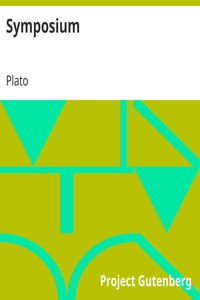Symposium by Plato
"Symposium" by Plato is a philosophical dialogue written during the late 4th century BC. The work centers on a banquet at which prominent figures, including Socrates, Phaedrus, Aristophanes, and Alcibiades, take turns delivering speeches in praise of love, exploring the various dimensions and ideals of the concept. Through their discussions, the dialogue delves into themes such as the nature of love, the relationship between physical attraction and deeper emotional connections, and the
role of love in achieving virtue and wisdom. The opening of the "Symposium" introduces a character named Apollodorus, who recounts the events of the banquet, eager to share the speeches on love he learned from his friend Aristodemus. Apollodorus describes how Socrates, invited by Agathon to the celebration following his victory in the dramatic competitions, engages with various guests, each of whom presents their unique perspectives on love. Notably, the speeches explore the distinctions between different types of love—earthly vs. heavenly—and the implications of love on personal virtue and societal dynamics, setting the stage for a rich examination of this central human experience that runs throughout the dialogue. (This is an automatically generated summary.)
Read or download for free
| How to read | Url | Size | |||
|---|---|---|---|---|---|
| Read now! | https://www.gutenberg.org/ebooks/1600.html.images | 221 kB | |||
| EPUB3 (E-readers incl. Send-to-Kindle) | https://www.gutenberg.org/ebooks/1600.epub3.images | 140 kB | |||
| EPUB (older E-readers) | https://www.gutenberg.org/ebooks/1600.epub.images | 142 kB | |||
| Kindle | https://www.gutenberg.org/ebooks/1600.kf8.images | 243 kB | |||
| older Kindles | https://www.gutenberg.org/ebooks/1600.kindle.images | 231 kB | |||
| Plain Text UTF-8 | https://www.gutenberg.org/ebooks/1600.txt.utf-8 | 196 kB | |||
| Download HTML (zip) | https://www.gutenberg.org/cache/epub/1600/pg1600-h.zip | 140 kB | |||
| There may be more files related to this item. | |||||
Similar Books
About this eBook
| Author | Plato, 428? BCE-348? BCE |
|---|---|
| Translator | Jowett, Benjamin, 1817-1893 |
| Title | Symposium |
| Note | Wikipedia page about this book: https://en.wikipedia.org/wiki/Symposium_(Plato) |
| Credits | Produced by Sue Asscher, and David Widger |
| Reading Level | Reading ease score: 65.6 (8th & 9th grade). Neither easy nor difficult to read. |
| Language | English |
| LoC Class | B: Philosophy, Psychology, Religion |
| LoC Class | PA: Language and Literatures: Classical Languages and Literature |
| Subject | Classical literature |
| Subject | Socrates, 470 BC-399 BC |
| Subject | Philosophy, Ancient |
| Subject | Love -- Early works to 1800 |
| Category | Text |
| EBook-No. | 1600 |
| Release Date | Jan 1, 1999 |
| Most Recently Updated | Mar 4, 2013 |
| Copyright Status | Public domain in the USA. |
| Downloads | 10451 downloads in the last 30 days. |
| Project Gutenberg eBooks are always free! | |

